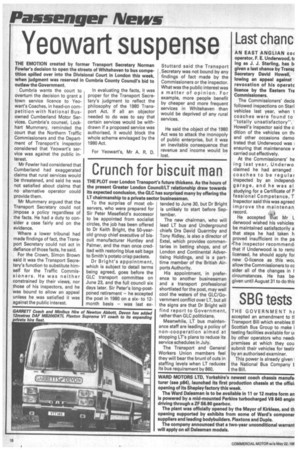Yeowart suspense
Page 12

If you've noticed an error in this article please click here to report it so we can fix it.
THE EMOTION created by former Transport Secretary Norman Fowler's decision to open the streets of Whitehaven to bus compe tition spilled over into the Divisional Court in London this week, when judgment was reserved in Cumbria County Council's bid to outlaw the Government.
Cumbria wants the court to overturn the decision to grant a town service licence to Yeowart's Coaches, in head-on competition with National Busowned Cumberland Motor Services. Cumbria's counsel, Lockhart Mummery, reminded the court that the Northern Traffic Commissioners and the Department of Transport's inspector considered that Yeowart's service was against the public interest.
Mr Fowler had considered that Cumberland had exaggerated claims that rural services would be threatened, and said he was not satisfied about claims that no alternative operator could provide them.
Mr Mummery argued that the Transport Secretary could not impose a policy regardless of the facts. He had a duty to consider a case fairly and on the evidence.
Where a lower tribunal had made findings of fact, the Transport Secretary could not act in defiance of those facts, he said.
For the Crown, Simon Brown said it was the Transport Secretary's function to substitute himself for the Traffic Commissioners. He was neither constrained by their views, nor those of his inspectors, and he was bound to allow an appeal unless he was satisfied it was against the public interest. In evaluating the facts, it was proper for the Transport Secretary's judgment to reflect the philosophy of the 1980 Transport Act. If all an objector needed to do was to say that certain services would be withdrawn if a proposed service was authorised, it would block the whole scheme envisaged by the 1980 Act.
For Yeowart's, Mr A. R. D. Stuttard said the Transport • Secretary was not bound by any findings of fact made by the Commissioners or the inspector. What was the public interest was a matter of opinion. For example, more people benefit by cheaper and more frequent services in Whitehaven than would be deprived of any rural services.
He said the object of the 1980 Act was to attack the monopoly of public enterprise, but it was an inevitable consequence that revenue and income would be lost.






























































































